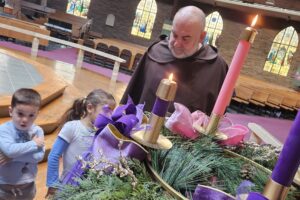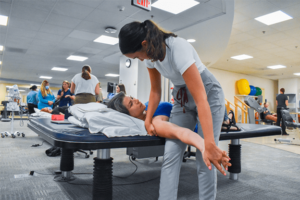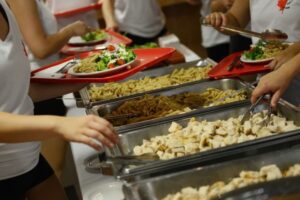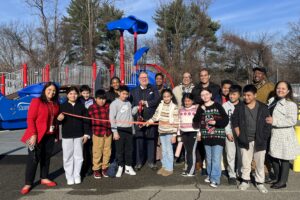
Briarcliff High School senior Edmund Tsou wanted to find a more cost-effective way to help paralyzed people communicate. Now, he is enjoying the fruits of his labor, having been recognized by several organizations for his work in science research.
Edmund began with one specific goal in mind.
“I wanted to help people with paralysis communicate using their brainwaves,” he said. “And so far, everything that has been done requires extensive surgery or hundreds of thousands of dollars’ worth of equipment, so I wanted to do it in a more cost-effective way,” he said.
When he was a sophomore, Edmund started in the Science Research class at the high school.
“You begin the course by reading articles and finding a mentor, and then you design your plan and conduct research,” he said about the three-year-course.
Edmund found a mentor who is a medical doctor working in AI-driven drug discovery.
“I had a goal in mind, but my initial ideas weren’t feasible given the resources I had available,” he said. “My mentor helped me a lot to streamline my ideas into a project I could complete independently.”
His research had two parts: finding a lower-cost form of brain-computer interface communication and working on increasing the speed of this communication.
“To establish a less expensive form of communication, I bought a meditation device on Amazon,” he said. “It’s a headband that uses brainwave data to tell whether or not the user is focused during meditation, but I was able to extract the raw data to train a machine learning model. In order to collect data for my research I wrote an IRB proposal and then used family and friends to help me collect the data.”
The problem was that a less expensive device also means slower speeds.”
To increase the speed of communication, Edmund used the computer programming language Python to find the optimal language model setup to reduce user workload. This way, the user only has to provide keywords instead of full sentences while the language model generates the rest of the sentence.
The research was not without challenges. In the middle of Edmund’s research, his mentor switched jobs and was not available to help him as much as before.
“My mentor lived in Canada after working at IBM, so things got hectic for him and there was less opportunity to email with him,” he said.
Another challenge was having to learn a lot of the coding and machine learning skills on his own.
“There is a problem called language model hallucination where the language model generates details that aren’t what the user provided. I came up with a solution to have it generate four sentence options instead of one,” he said. “So, if, originally, you provided the keywords “table” and “window” in the hope of getting a table by the window at a restaurant as you walked in, you would likely get a sentence that wasn’t what you intended to say, such as ‘I’d like to reserve a table at the window for tomorrow with a friend.’ But with my solution, there would be four options to choose from, which gives you a more accurate prediction, since one of them will likely be a closer match.”
Edmund is grateful for attending the Science Research class.
“Science Research is definitely one of the best programs we have here at the school,” he said. “The more work you put into it, the more you get out of it. For example, my presentation skills have really improved.”
Edmund, who plans to attend Johns Hopkins University in the fall, where he will major in biomedical engineering, credits his teachers with helping him along the way.
“Ms. (Annmarie) O’Brien worked with me through the entire process and helped me find my mentor,” he said. “Ms. (Gilana) Reiss also helped a lot, especially with applying for competitions and with preparing for presentations.”
He is also grateful to his parents for their support.
“My dad is a research manager and works with genetics and AI, and he helped me come up with the idea,” he said “He was very involved. Although my mom was less involved, she was also supportive of my work.”
These are Edmund’s awards:
Regeneron Science Talent Scholar, First Place regional award in Computational Biology & Bioinformatics at WR-JSHS, Upstate JHSH Finalist, First Place award at Upstate JHSH and National JHSH finalist, George D. Yancopolous Award – Innovations in Science Award at 2024 WESEF, Second Place Computational Biology & Bioinformatics at 2024 WESEF, Second Place in Biomedical Engineering at NYSSEF, U.S. Airforce Award at NYSSEF, Second Place in Computer Science & Mathematics at 2022 Somers Science Fair.






